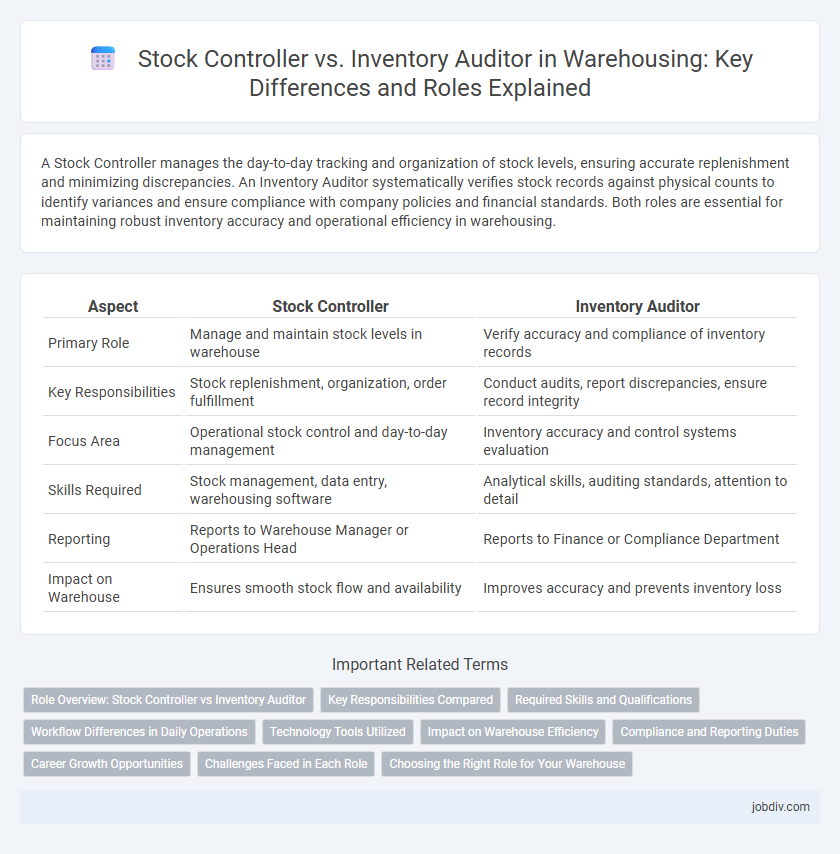A Stock Controller manages the day-to-day tracking and organization of stock levels, ensuring accurate replenishment and minimizing discrepancies. An Inventory Auditor systematically verifies stock records against physical counts to identify variances and ensure compliance with company policies and financial standards. Both roles are essential for maintaining robust inventory accuracy and operational efficiency in warehousing.
Table of Comparison
| Aspect | Stock Controller | Inventory Auditor |
|---|---|---|
| Primary Role | Manage and maintain stock levels in warehouse | Verify accuracy and compliance of inventory records |
| Key Responsibilities | Stock replenishment, organization, order fulfillment | Conduct audits, report discrepancies, ensure record integrity |
| Focus Area | Operational stock control and day-to-day management | Inventory accuracy and control systems evaluation |
| Skills Required | Stock management, data entry, warehousing software | Analytical skills, auditing standards, attention to detail |
| Reporting | Reports to Warehouse Manager or Operations Head | Reports to Finance or Compliance Department |
| Impact on Warehouse | Ensures smooth stock flow and availability | Improves accuracy and prevents inventory loss |
Role Overview: Stock Controller vs Inventory Auditor
Stock Controllers manage stock levels by monitoring inventory flow, coordinating with suppliers, and ensuring accurate stock records to meet operational demands. Inventory Auditors conduct detailed examinations of inventory accuracy through regular audits, validating physical stock against recorded data to identify discrepancies and prevent loss. Both roles are crucial for maintaining inventory integrity but differ in execution focus: proactive stock management versus retrospective inventory verification.
Key Responsibilities Compared
Stock Controllers manage stock levels by monitoring inventory, coordinating stock replenishment, and ensuring accurate stock records to prevent shortages or overstock situations. Inventory Auditors focus on verifying inventory accuracy through regular audits, identifying discrepancies, and implementing controls to maintain data integrity and compliance. Both roles are essential for effective warehouse management, with Stock Controllers emphasizing operational stock flow and Inventory Auditors prioritizing accuracy and accountability.
Required Skills and Qualifications
Stock Controllers require strong organizational skills, proficiency in inventory management software, and the ability to oversee stock levels and order supplies efficiently. Inventory Auditors need expertise in auditing techniques, attention to detail for verifying stock accuracy, and knowledge of compliance regulations and financial reporting standards. Both roles demand analytical abilities, good communication skills, and experience in data analysis to ensure accurate inventory tracking and control.
Workflow Differences in Daily Operations
Stock Controllers manage real-time stock levels by coordinating incoming shipments, updating inventory systems, and organizing storage locations to ensure smooth warehouse operations. Inventory Auditors conduct periodic checks to verify stock accuracy through physical counts, reconciliation with records, and reporting discrepancies for compliance and financial auditing. While Stock Controllers focus on daily stock movement and replenishment, Inventory Auditors emphasize accuracy and accountability in inventory records through scheduled audits.
Technology Tools Utilized
Stock Controllers utilize warehouse management systems (WMS) and barcode scanning technology to track real-time stock levels, streamline order picking, and optimize storage space. Inventory Auditors rely heavily on audit software and data analytics tools to perform accuracy checks and compliance verification, often integrating with enterprise resource planning (ERP) systems. Both roles leverage RFID technology and mobile applications to enhance inventory visibility and improve operational efficiency in warehousing environments.
Impact on Warehouse Efficiency
Stock controllers maintain accurate records of incoming and outgoing goods, directly influencing timely order fulfillment and reducing stock discrepancies. Inventory auditors verify stock accuracy and compliance, identifying inefficiencies and potential losses through systematic audits. Together, their roles enhance warehouse efficiency by ensuring precise inventory management and minimizing operational disruptions.
Compliance and Reporting Duties
Stock Controllers ensure accurate real-time tracking of inventory levels, maintaining compliance with company policies by regularly updating stock records and preparing compliance reports for internal audits. Inventory Auditors perform detailed reviews of stock data, verifying physical inventory matches recorded figures and identifying discrepancies to ensure adherence to regulatory standards and accurate financial reporting. Both roles contribute to comprehensive reporting frameworks that support inventory accuracy and regulatory compliance in warehousing operations.
Career Growth Opportunities
Stock Controllers often progress to roles such as Warehouse Manager or Supply Chain Analyst by mastering inventory management and logistical coordination, which enhances operational efficiency. Inventory Auditors typically advance into positions like Compliance Manager or Internal Auditor, leveraging their expertise in auditing processes and regulatory standards to ensure accurate stock records. Both careers offer distinct pathways, with Stock Controllers focusing on operational leadership and Inventory Auditors emphasizing analytical and compliance-driven roles.
Challenges Faced in Each Role
Stock controllers often face challenges related to real-time stock accuracy, managing discrepancies between physical counts and digital records, and handling frequent stock movements in fast-paced warehouse environments. Inventory auditors encounter difficulties in verifying stock integrity, detecting fraud or theft, and ensuring compliance with regulatory standards during periodic audits. Both roles require meticulous attention to detail and robust systems to mitigate risks associated with stock mismanagement and data inconsistencies.
Choosing the Right Role for Your Warehouse
Selecting between a Stock Controller and an Inventory Auditor hinges on your warehouse's operational priorities. Stock Controllers focus on managing daily stock levels, order processing, and stock replenishment to ensure smooth workflow. Inventory Auditors specialize in verifying stock accuracy, compliance, and conducting periodic audits to prevent discrepancies and losses.
Stock Controller vs Inventory Auditor Infographic

 jobdiv.com
jobdiv.com